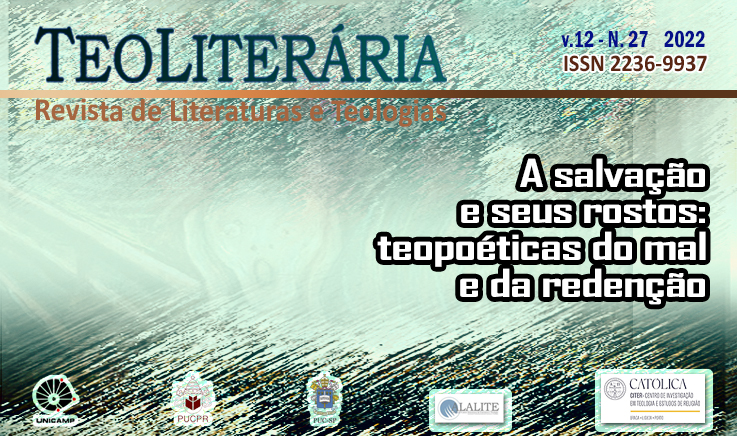The Dantean pilgrimage
from desire, in freedom, towards love
DOI:
https://doi.org/10.23925/2236-9937.2022v27p115-128Keywords:
Dante, peregrino, camino, libertad, amorAbstract
Dante Alighieri, "the great poet, prophet of hope, witness of infinite thirst" (Pope Francis) invites us to immerse ourselves in his masterpiece, The Divine Comedy, in the depths of man, on a journey that leads through the lights and shadows that both he and we, today, experience on this path of life.
Nel mezzo del cammin di nostra vita, mi ritrovai per una selva oscura, che la diritta via era smarrita. […] Lasciate ogne speranza, voi ch’intrate. These verses refer us to the pilgrim who forges his life in each step and in action he wishes, chooses, suffers, loves. It is in the existential dynamic where ontologically, as a source, the source of being, the drama of freedom in which we are all immersed is manifested. Dante is the subject of that drama and makes us part of it. In the central songs of Purgatorio, XVI, XVII and XVIII, the poet sings the dynamism of freedom, responsibility, good and evil in dance and interdisciplinary dialogue, but above all existential.
References
ALIGHIERI DANTE. (2001) Divina Comedia. Inferno-Purgatorio-Paradiso. Roma: Newton & Compton Editori. Introduzione di Italo Borzi. Commento a cura di Giovanni Fallani e Silvio Zennaro.
ALIGHIERI DANTE. (2021) Divina Comedia. Buenos Aires: Colihue. 3 tomos. Traducción, notas, comentarios e Introducción de Claudia Fernández Spier.
AVENATTI DE PALUMBO CECILIA. (2002). La literatura en la Estética de Hans Urs von Balthasar. Figura, drama y verdad. Salamanca: Secretariado Trinitario.
AUERBACH ERICH. (1971). Studi su Dante. Milano: Feltrinelli. Traduzione di Maria Luisa de Pier Bonino.
BENEDICTO XVI. (2005). Deus Caritas est. Carta Encíclica. En línea: https://www.vatican.va/content/benedictxvi/es/encyclicals/documents/hf_ben-xvi_enc_20051225_deus-caritas-est.html
BENEDICTO XVI. (2006). Discurso del Santo Padre Benedicto XVI a los participantes en un congreso internacional organizado por el Consejo Pontificio “Cor Unum”. En línea: https://www.vatican.va/content/benedict-xvi/es/speeches/2006/january/documents/hf_ben xvi_spe_20060123_cor-unum.html
CACCIARI MASSIMO. (2012). Doppio ritratto. San Francesco in Dante e Giotto. Milano: Adelphi Edizioni.
CACCIARI MASSIMO. (2017). Dante y la Divina Comedia. España: Confluencias Editorial. Traducción de María Nogués.
CAPANO DANIEL. (2016). “Amor profano y amor sagrado en Dante”. Actas de VI Congreso Internacional de Literatura, Estética y Teología, Facultades de Filosofía y Letras y Teología UCA. Asociación Latinoamericana de Literatura y Teología (Alalite) En: https://repositorio.uca.edu.ar/bitstream/123456789/4330/1/amor-profano-sagrado-dante.pdf
CRESPO ÁNGEL. (1999). Dante y su obra. Barcelona: El Acantilado.
CÚNSULO RAFAEL. (1989). El libre albedrío. Santo Tomás y Cornelio Fabro. Roma: Pontificia Studiorum Universitas A S. Thoma Aq, in Urbe.
DE AQUINO TOMÁS. Suma Teológica. Barcelona: BAC. 5 Tomos.
GESCHÉ ADOLPHE. (2002). El mal. Dios para pensar I. Salamanca: Sígueme
GILBERT PAUL. (2008), Metafísica. La paciencia del ser. Salamanca: Sígueme.
HAAS, ALOIS. (2009). “El deseo inextinguible”, en: Viento de lo absoluto, ¿Existe una sabiduría mística de la posmodernidad?, Barcelona: Siruela. 81.
KELEN, JACQUELINE. (2004). El deseo o el ardor del corazón, Barcelona: El Barquero.
MAGNAVACCA SILVIA. (1992). El deseo. Hilo conductor de la Divina Comedia. Buenos Aires: PRIMED-CONICET. En línea.
http://www.imhicihu-conicet.gob.ar/html/Publ_Libros/Magnavacca_150dpi.pdf
PAPA FRANCISCO. (2021). Candor Lucis Aeternae. Carta Apostólica del Santo Padre Francisco en el VII Centenario de la muerte de Dante Alighieri. En línea.
PÉREZ CARRASCO MARIANO. (2021). La palabra deseada. La Divina Comedia en el mundo contemporáneo. Buenos Aires: Mardulce.
Published
How to Cite
Issue
Section
License
Copyright (c) 2022 Teoliteraria - Journal of Literatures and Theologies (On Line) ISSN 2236-9937

This work is licensed under a Creative Commons Attribution 4.0 International License.
TeoLiteraria – Journal of Literatures and Theologies owns the copyright of all published material. The whole reproduction of the articles of this Journal in other publications or for any other purpose, by any means, requires a written permission of the editor of this journal. Partial reproductions of articles (abstracts, more than 500 words text, tables, figures and other illustrations) must have a permission written by the publisher and the authors.

